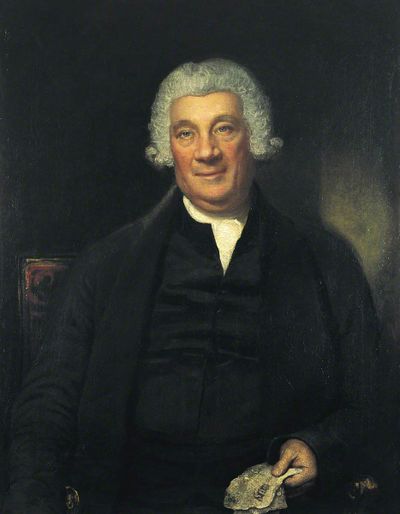Annotation:Abraham Newland: Difference between revisions
No edit summary |
No edit summary |
||
| (5 intermediate revisions by the same user not shown) | |||
| Line 1: | Line 1: | ||
{{TuneAnnotation | {{TuneAnnotation | ||
|f_annotation='''ABRAHAM NEWLAND'''. AKA - "Abram Newland." English, Jig (6/8 time). G Major. Standard tuning (fiddle). AAB. | |f_annotation=[[File:Abramnewland.jpg|right|400px|thumb|Drummond, Samuel; Abraham Newland (1730-1807), Chief Cashier of the Bank of England (1782-1807); Bank of England; http://www.artuk.org/artworks/abraham-newland-17301807-chief-cashier-of-the-bank-of-england-17821807-50291]]'''ABRAHAM NEWLAND'''. AKA - "Abram Newland." English, Jig (6/8 time). G Major. Standard tuning (fiddle). AAB. Abraham 'Abram' Newland (c. 1730 – 1807) was the chief cashier at the Bank of England from 1782 to 1807, where he slept in his apartment for 25 years even though he owned a house. His only relaxation was a daily drive to Highbury, where he took a walk along Highbury Place and had tea in a cottage. When he resigned in 1807 he refused the offer of an annuity, but did agree to accept a very expensive tea service of plate (which he did not live long enough to see). | ||
|f_printed_sources=Elias Howe ('''Musician's Companion Part 3'''), 1844; p. | <br> | ||
<br> | |||
Newland's signature on a bank note was required if the note were to be considered genuine. As a consequence, an 'Abraham Newland' came in to mean the bank note itself in popular use, a fact used by songwriter Charles Dibdin, who wrote a song about him, performed at Sadler's Wells: | |||
<blockquote> | |||
''Tere ne'er was a name so handed by fame,''<br> | |||
''Thro' air, thro' ocean, and thro' land,''<br> | |||
''As one that is wrote upon every bank note,''<br> | |||
''And you all must know Abraham Newland.''<br> | |||
<br> | |||
''Oh, Abraham Newland!''<br> | |||
''Notified Abraham Newland!''<br> | |||
''I have heard people say, sham Abraham you may,''<br> | |||
''But you must not sham Abraham Newland.''<br> | |||
</blockquote> | |||
He is also remembered for his self-penned epitaph: | |||
<blockquote> | |||
''Beneath this stone old Abraham lies;''<br> | |||
''Nobody laughs, and nobody cries.''<br> | |||
''Where he has gone, and how he fares,''<br> | |||
''Nobody knows and nobody cares.''<br> | |||
</blockquote> | |||
|f_printed_sources=Elias Howe ('''Musician's Companion Part 3'''), 1844; p. 59. | |||
}} | }} | ||
Latest revision as of 14:54, 8 November 2022
X: 1 T: ABRAHAM NEWLAND C: %R: jig B: Elias Howe "The Musician's Companion" Part 3 1844 p.59 #1 S: http://imslp.org/wiki/The_Musician's_Companion_(Howe,_Elias) S: https://archive.org/stream/firstthirdpartof03howe/#page/66/mode/1up Z: 2015 John Chambers <jc:trillian.mit.edu> M: 6/8 L: 1/8 F:http://www.john-chambers.us/~jc/music/book/EliasHowe/MusiciansCompanionP3-1844-V2.abc K: G % - - - - - - - - - - - - - - - - - - - - - - - - - |:\ B2B Bcd | e2e e3 | d2d d2B | d3 B3 |\ B3B Bcd | e2e e3 | def g2G | A3 G3 :| g2g f2f | e2e def | g2g f2d | e3 d3 |\ gbg faf | ege def | (g//a//b3/)g fed | e3 df"^D.C."c |] % - - - - - - - - - - - - - - - - - - - - - - - - -

Newland's signature on a bank note was required if the note were to be considered genuine. As a consequence, an 'Abraham Newland' came in to mean the bank note itself in popular use, a fact used by songwriter Charles Dibdin, who wrote a song about him, performed at Sadler's Wells:
Tere ne'er was a name so handed by fame,
Thro' air, thro' ocean, and thro' land,
As one that is wrote upon every bank note,
And you all must know Abraham Newland.
Oh, Abraham Newland!
Notified Abraham Newland!
I have heard people say, sham Abraham you may,
But you must not sham Abraham Newland.
He is also remembered for his self-penned epitaph:
Beneath this stone old Abraham lies;
Nobody laughs, and nobody cries.
Where he has gone, and how he fares,
Nobody knows and nobody cares.

